
“
Online shopping addiction effects & how to stop is a growing concern in today’s digital age, where convenience meets temptation. This behavioral addiction impacts mental health, finances, and personal relationships. Recognizing these effects early is crucial, along with practical steps to regain control and break free from compulsive buying habits. 1
1
”
Psychologist Dr. Jeffrey Young describes online shopping addiction as a form of compulsive behavior where individuals experience intense urges to shop despite negative consequences. 1
Online shopping addiction can lead to increased anxiety and stress, as compulsive buyers often hide their purchases, creating guilt and secrecy that affect mental health. 2

Financial debt is a major consequence of online shopping addiction, as frequent impulsive purchases accumulate quickly, resulting in unpaid bills and damaged credit scores.
Relationship conflicts often arise because addicted shoppers prioritize buying over family and friends, causing emotional distance and trust issues in personal connections. 3
The accessibility and 24/7 availability of online stores increase temptation, making it harder for addicted individuals to resist urges and control spending habits. 4
People addicted to online shopping frequently experience a temporary dopamine rush, similar to substance addictions, which reinforces the behavior despite harmful outcomes. 5
Online shopping addiction disrupts daily routines and responsibilities, as individuals spend excessive time browsing, purchasing, and tracking packages, reducing productivity. 6
Studies show that excessive online shopping is linked to underlying mental health disorders such as depression and obsessive-compulsive disorder, and worsening overall well-being. 7
Many addicted shoppers struggle to acknowledge their problem, often rationalizing purchases or blaming external factors, which delays seeking help and intervention. 8

Credit card companies report a rise in late payments and maxed-out limits caused by compulsive online shopping. Frequent impulsive purchases without a budget often lead to serious financial problems.
People with online shopping addiction tend to socially withdraw, avoiding events that don’t involve shopping or browsing online. This isolation boosts loneliness and deepens reliance on online shopping. 9
Mindfulness techniques help reduce online shopping urges by increasing awareness of emotional triggers like stress or boredom, allowing individuals to better control impulsive spending before it happens. 10
Setting strict budgets and using spending-monitoring apps help addicted shoppers regain financial control. These tools raise awareness about expenses and limit impulsive buying through clear spending boundaries. 11
Support groups and therapy, especially cognitive-behavioral therapy, effectively address the psychological causes of online shopping addiction, helping people identify triggers and develop healthier behaviors. 12
Taking digital detoxes or breaks from online activity reduces exposure to tempting ads and shopping sites, helping addicted individuals reset unhealthy patterns and reduce compulsive buying urges. 13

Keeping a shopping diary helps track purchases and emotions, enabling people to recognize spending patterns and triggers so they can develop better coping strategies.
Family and friends play an important role by offering emotional support, encouraging accountability, and helping addicted individuals recognize when they need professional help. 14
Dr. Melanie Greenberg highlights that self-compassion is essential because shame and guilt tend to worsen addiction and block recovery progress. 15
Philosophers recommend intentional living and practicing gratitude to overcome materialistic urges, fostering a sense of contentment beyond possessions. 16
Long-term recovery from online shopping addiction requires persistence, ongoing self-reflection, and the willingness to embrace healthier habits for sustained well-being. 17


